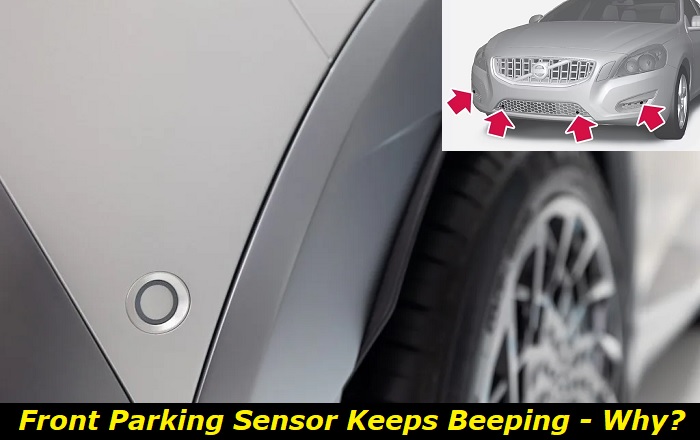With the help of the front parking sensors, you can avoid colliding with objects directly in front of your vehicle. When you are about to hit something, the parking sensors will alert you with an audio and visual alarm. This is indeed a nice feature for bumper-to-bumper traffic conditions and challenging parking spaces.
Electrical gremlins highlights
- Level of urgency:medium
- DIY inspection:impossible
- DIY repair:impossible
- Can you drive?yes
- Price for repairs:$0 - $300
- Symptoms:glitch, unusual behavior, temporary problem
- Ways to solve:check the battery voltage, check wiring and connections, take it to a professional mechanic

Most Common Reasons Why Your Front Parking Sensor Keeps on Beeping
When diagnosing the cause of the problem, make sure that the beeping sound is definitely coming from the front parking sensor because there are many things that can produce similar warning noises in your vehicle. Among them are open doors, an unlatched hood or trunk, a partially open fuel door, unfastened seatbelts, and various warnings coming from the different safety features of your auto.
With those things out of the way, and if you're positive that it's the front parking sensor really emitting that sound, here are some of the conditions that you need to check:
1. System Errors
Topping this list as the most common reason for a front parking sensor beeping incessantly even when there's nothing in front of your vehicle is a glitch in your auto's electrical system. Normally, these gremlins will go away after you turn off and on your engine, and you drive your car at least a mile. A hard reset by disconnecting your battery for at least 15 minutes to no more than 30 minutes may also be worth a shot if the first solution does not work.
However, if the errors persist, you may need to have your car's engine control unit (ECU) reflashed so its software will be synced with your vehicle manufacturer's recommended calibration settings while eliminating bugs within its system along the way.
2. Dirt or Object Obstructing the Sensor
The other most common reason why sensors usually malfunction in cars is due to dirt covering them or objects hindering their function. Dirt and debris can block the signal from the sensors, causing them to falsely recognize them as potential obstructions along the way, and thus, trigger the beeping sound in your auto.
In order to diagnose this problem, it is important to check whether any object like dust, mud, grime, ice, or piece of plastic is present on the front parking sensor and if there are any objects in close proximity that may interfere with its signal. If any of these conditions are present, the thing hindering its function should be removed or the car should be moved away from the source of the interference as soon as possible.
In some cases, thorough cleaning of the sensor may be necessary to restore its functionality. This should ideally be done using compressed air or a soft cloth dampened with a cleaning solution made for sensors.
If dust or particles still remain on the surface of the sensor even after cleaning, then patiently repeat the process using a lint-free cloth and canned air until the thing blocking the sensor is removed. However, if the contamination is so severe that you can no longer remove them through the methods stated here or if the dirt has led to the corrosion of the critical components of the sensor, then, by all means, have them replaced already.
3. Busted Sensor
One more key culprit in this kind of problem is a busted sensor. You can easily spot one if it shows burn marks, cracking, or any form of physical damage. However, in the absence of visual indicators, better whip out your trusty multimeter to aid you in your diagnosis.
A multimeter should be used to check whether there is continuity between the terminals of the sensors to make sure that it is still working. Ideally, you should measure resistance between the two pins of your parking sensor.
If the reading shows an open circuit (no resistance), indicating that there's no power flow, then it might be necessary to replace your parking sensors already with a new set. It is important to note that replacing them by yourself isn't advisable because these parts are highly sensitive and require expertise for installation. Therefore, it would be better to let a qualified technician handle the job.
After all the necessary repairs, it is important to test the parking sensor system again to ensure that the problem has been resolved. If the parking sensors still trigger a beeping sound even if there are no nearby obstructions, then you should contact your car's manufacturer for further assistance or have them replaced again if necessary.
4. Wiring Issues in the Sensor
Faulty wiring can be the cause of a beeping front parking sensor, and it's important to diagnose the issue before attempting any repairs. Visual check-ups of the wiring can help identify potential issues with insulation or corrosion, while using a multimeter will provide more precise information on whether there is an electrical fault in the circuit.
The most common symptoms that accompany faulty wiring are dim headlights, lights flickering on and off randomly, dashboard warning lights coming on intermittently, and electronics not working properly.
To begin diagnosing faulty wiring causing the parking sensor to beep, start by visually inspecting any visible cables for damage or corrosion. If you find any frayed wires or exposed metal contacts, this could indicate a dangerous fault in the wiring. Additionally, check underneath the dashboard for exposed wires or corroded connections that may be related to the parking sensor system.
Finally, use a multimeter to measure the electrical resistance between certain points in the wiring circuit to ensure there are no shorts or breaks in continuity. If any of these tests indicate an issue with the wiring, it is important that you take your vehicle to a qualified automotive technician for repair.
Failing to do so could result in further damage, fire, or even a dangerous electrical shock. Taking care of faulty wiring as soon as possible will help keep you and your vehicle safe on the road.
5. Draining or Overcharged Battery
When a battery is either overcharged or drained, it can cause the front parking sensor to beep along with other electrical issues. Most of the time, the other symptoms may not be immediately evident.
Often, these symptoms are subtle and gradual, making them difficult to detect without an experienced eye. To diagnose the battery issue causing this symptom, it's best to begin with a visual check-up.
First, inspect the terminals and cables of the battery for any signs of corrosion or damage. Next, look at the indicators on the side of your car's dashboard which will allude to what condition your battery is in (red means discharged and green means charged). Lastly, open up your hood and look for any visible swelling or leaks around the battery.
If what you've seen is inconclusive, it's best to use a multimeter to measure the voltage of your car's battery. A lead-acid battery is considered fully charged when its voltage reaches 12.6 volts and above, while 12.4 volts or lower indicates that the battery has been drained out of power. If there are no problems with the connections and cables and the values are way off the recommended, then this usually means that it's time for a replacement.
It's important to keep in mind that an overcharged battery may also cause the parking sensor to go haywire, so if you've noticed any signs such as distorted casing or overheating of components, it might be worth having a professional take a look at it to ensure that your vehicle is running in tip-top condition.
Diagnosing the issue causing a parking sensor to beep can be tricky without the right know-how, so if you ever find yourself stuck, it's best to consult with a professional for further advice and guidance. With these steps and a little bit of patience, you should be able to figure out what's wrong with your car's battery and get back on the road in no time.
6. Blown Fuse
When diagnosing a blown fuse in a vehicle, there are several symptoms to look out for aside from the beeping front parking sensor. These can include loss of power to certain parts of the vehicle, such as headlights or accessories like an audio system, indicators that do not work properly, and flickering lights. These symptoms indicate that one or more fuses have been over-stressed due to excessive current drawn from them, which causes them to eventually blow.
Diagnosing a malfunctioning fuse causing the parking sensor to beep requires careful visual check-ups and the use of a multimeter. First, visually inspect all of the fuses related to this problem on both sides of the dashboard and under the hood.
Pay attention to the condition of the fuse, as a swollen or corroded-looking fuse is usually a sign that it has blown. Once this inspection is complete, use a multimeter to locate and measure any current going through the fuse. If there is no power running through it, then the fuse has most likely blown. Replacing the blown fuse should fix the issue with the parking sensor beeping.
It is important to note that an electrical issue can have multiple causes, so in some cases replacing a blown fuse may not resolve all problems associated with it. If a further diagnosis of the wiring or other components connected to the fault is required, consult with an experienced automotive technician for guidance before attempting any repairs yourself. This will help ensure that you are getting accurate troubleshooting and repair advice.
Conclusion
By following these diagnostic steps and troubleshooting each of the factors mentioned here, one can identify where exactly lies the source of the problem and take appropriate action from there in order to restore the normal operation of the front parking sensors.
Without properly diagnosing any issue before attempting repairs, the chances are high that your fix will be unsuccessful. Likewise, you may also end up repairing or replacing something that is not even a part of the problem, which can add to unnecessary expenses on your end.
About the authors
The CarAraC research team is composed of seasoned auto mechanics and automotive industry professionals, including individuals with advanced degrees and certifications in their field. Our team members boast prestigious credentials, reflecting their extensive knowledge and skills. These qualifications include: IMI: Institute of the Motor Industry, ASE-Certified Master Automobile Technicians; Coventry University, Graduate of MA in Automotive Journalism; Politecnico di Torino, Italy, MS Automotive Engineering; Ss. Cyril and Methodius University in Skopje, Mechanical University in Skopje; TOC Automotive College; DHA Suffa University, Department of Mechanical Engineering






Add comment